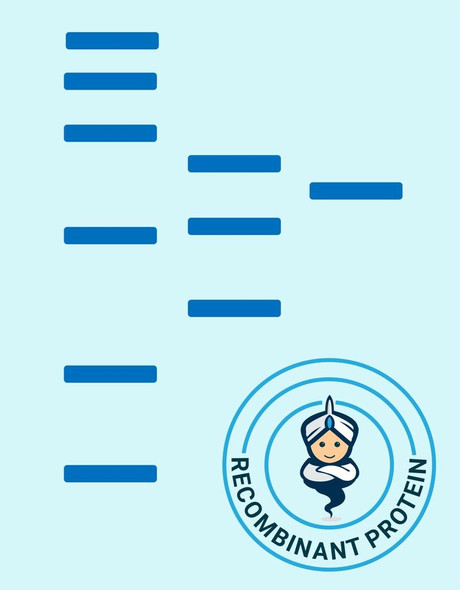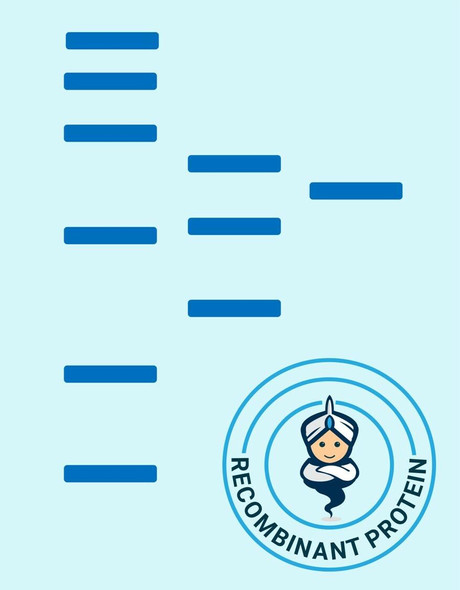Description
| Product Name: | Human NMRAL1 Recombinant Protein |
| Product Code: | RPPB4114 |
| Size: | 20µg |
| Species: | Human |
| Target: | NMRAL1 |
| Synonyms: | NmrA-like family domain containing protein 1, short chain dehydrogenase/reductase family 48A member 1, HSCARG, SDR48A1, FLJ25918. |
| Source: | Escherichia Coli |
| Physical Appearance: | Sterile Filtered colorless solution. |
| Formulation: | The NMRAL1 solution (0.5mg/ml) contains 20mM Tris-HCl buffer (pH 8.0), 0.15M NaCl and 40% glycerol. |
| Stability: | Store at 4°C if entire vial will be used within 2-4 weeks. Store, frozen at -20°C for longer periods of time. For long term storage it is recommended to add a carrier protein (0.1% HSA or BSA).Avoid multiple freeze-thaw cycles. |
| Purity: | Greater than 95% as determined by SDS-PAGE. |
| Amino Acid Sequence: | MGSSHHHHHH SSGLVPRGSH MGSHMVDKKL VVVFGGTGAQ GGSVARTLLE DGTFKVRVVT RNPRKKAAKE LRLQGAEVVQ GDQDDQVIME LALNGAYATF IVTNYWESCS QEQEVKQGKL LADLARRLGL HYVVYSGLEN IKKLTAGRLA AAHFDGKGEV EEYFRDIGVP MTSVRLPCYF ENLLSHFLPQ KAPDGKSYLL SLPTGDVPMD GMSVSDLGPV VLSLLKMPEK YVGQNIGLST CRHTAEEYAA LLTKHTRKVV HDAKMTPEDY EKLGFPGARD LANMFRFYAL RPDRDIELTL RLNPKALTLD QWLEQHKGDF NLL |
NMRAL1 is a redox sensor protein which goes through reformation and subcellular rearrangement in reaction to alterations in intracellular NADPH/NADP+ levels. When the NADPH concentration is low the protein is found mostly as a monomer, and binds argininosuccinate synthase (ASS1), which takes part in nitric oxide synthesis. Association with ASS1 defects NMRAL1 activity and diminishes the production of nitric oxide, which then inhibits apoptosis. When the NADPH concentration is normal , the protein is found as a dimer and hides the binding site for ASS1.
NMRAL1 Human Recombinant produced in E. coli is a single polypeptide chain containing 323 amino acids (1-299) and having a molecular mass of 35.9 kDa.NMRAL1 is fused to a 24 amino acid His-tag at N-terminus & purified by proprietary chromatographic techniques.
| UniProt Protein Function: | Redox sensor protein. Undergoes restructuring and subcellular redistribution in response to changes in intracellular NADPH/NADP+ levels. At low NADPH concentrations the protein is found mainly as a monomer, and binds argininosuccinate synthase (ASS1), the enzyme involved in nitric oxide synthesis. Association with ASS1 impairs its activity and reduces the production of nitric oxide, which subsecuently prevents apoptosis. Under normal NADPH concentrations, the protein is found as a dimer and hides the binding site for ASS1. The homodimer binds one molecule of NADPH. Has higher affinity for NADPH than for NADP+. Binding to NADPH is necessary to form a stable dimer. |
| NCBI Summary: | This gene encodes an NADPH sensor protein that preferentially binds to NADPH. The encoded protein also negatively regulates the activity of NF-kappaB in a ubiquitylation-dependent manner. It plays a key role in cellular antiviral response by negatively regulating the interferon response factor 3-mediated expression of interferon beta. Alternative splicing of this gene results in multiple transcript variants. [provided by RefSeq, Feb 2015] |
| UniProt Code: | Q9HBL8 |
| NCBI GenInfo Identifier: | 762006039 |
| NCBI Gene ID: | 57407 |
| NCBI Accession: | NP_001292070.1 |
| UniProt Related Accession: | Q9HBL8 |
| Molecular Weight: | 33,344 Da |
| NCBI Full Name: | nmrA-like family domain-containing protein 1 isoform 1 |
| NCBI Synonym Full Names: | NmrA like redox sensor 1 |
| NCBI Official Symbol: | NMRAL1�� |
| NCBI Official Synonym Symbols: | HSCARG; SDR48A1�� |
| NCBI Protein Information: | nmrA-like family domain-containing protein 1 |
| UniProt Protein Name: | NmrA-like family domain-containing protein 1 |
| Protein Family: | NmrA-like family domain-containing protein |
| UniProt Gene Name: | NMRAL1�� |






